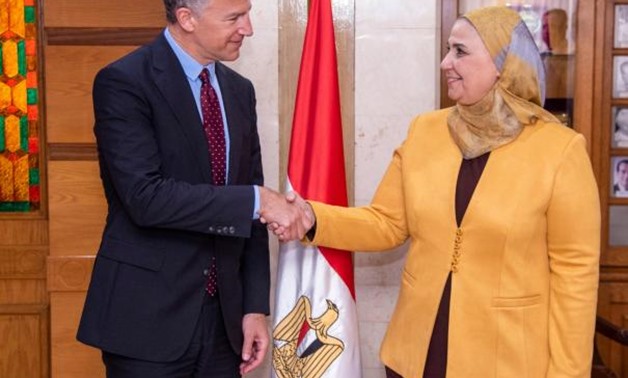
PRESS: (R) Social Solidarity Minister Nevin el Qabbaj shaking hands with (L) US ambassador to Cairo, Jonathan Cohen
CAIRO – 23 February 2020: Social Solidarity Minister Nevin el Qabbaj said Sunday that at least 2.5 million Egyptian families are benefiting from the Takaful and Karama (Solidarity and Dignity) Program, designed as a national targeted social safety-net mechanism to protect the poor through income support.
The minister added, during a meeting with US ambassador to Cairo, Jonathan Cohen, that the ministry has started restructuring and raising the efficiency of its employees through training and qualification.
Takaful and Karama conditional and unconditional cash transfer program is one of Egypt’s largest investments in human capital development. It was launched in 2015 with the support of a $400 million World Bank program.
A statement said in 2019 that the total beneficiaries of Takaful and Karama reached 2.2 million families by the end of 2018, in addition to 1.2 million families benefiting from social security.
Takaful and Karama program is implemented by the Ministry of Social Solidarity and has covered to date 2.26 million households which amount to approximately 9.4 million individuals, or approximately 10 percent of Egypt’s population.
The program provides conditional family income support aimed at increasing food consumption, reducing poverty, while encouraging families to keep children at school and providing them with needed health care.
Along with ensuring vulnerable families receive basic nutrition, the goal is to build the human capital of the next generation and give them a path out of poverty.
The program is "conditional", meaning that households receive a monthly transfer of LE 325 providing they are compliant with certain clearly defined requirements.
These include all household children should age from 6 to 18 and have at least an 80 percent school attendance record, four visits per year to health clinics by mothers and children below the age of 6, where child growth monitoring records are maintained, and nutrition awareness sessions are attended.
The sessions help promote better child feeding practices, regular immunizations, and antenatal and postnatal care of women. Households are given additional support for every 0-6 year-old child (LE 60), primary student (LE 80), preparatory stage student (LE 100) and secondary stage students (LE 140).
The program covers a maximum of 3 children per household and certifies beneficiaries every three years. There are 1,962,785 households enrolled in Takaful (which amount to approximately 8,341,836 individuals or 87 percent of the program’s total households).
Prime Minister Mostafa Madbouli said last July the government will continue to support social protection programs and the subsidy system, while establishing an accurate and sound database to determine the real beneficiaries.
This came during the second session of the simulation model of the Egyptian state at the seventh National Youth Conference. The session focused on the issues of social protection, terrorism, security challenges, and regional unrest.


Comments
Leave a Comment